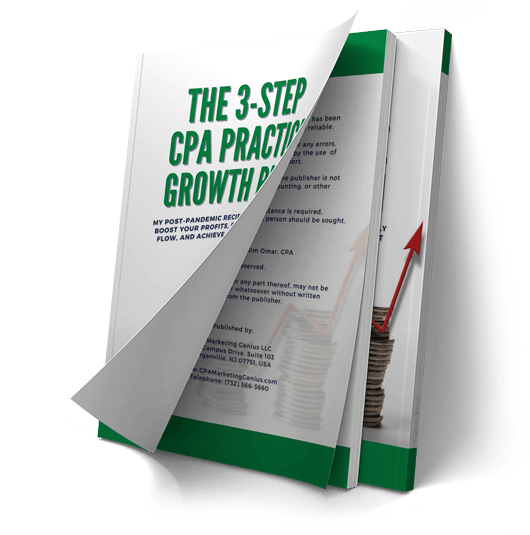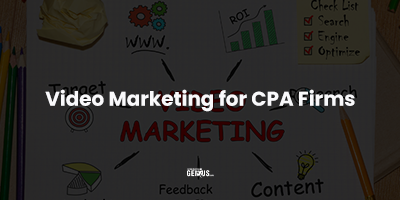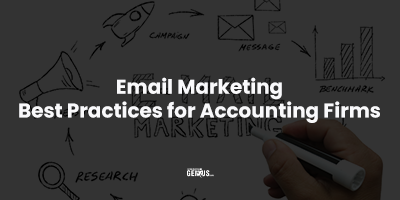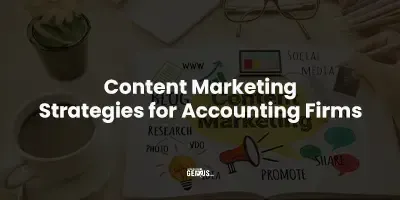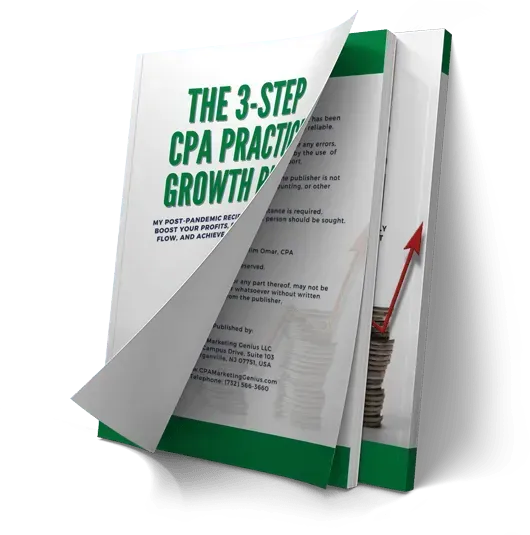The Impact of AI and Technology When Marketing An Accounting Firm
Discussing the latest technology trends in marketing and how they can be applied effectively in the accounting industry.
In the fast-paced world of accounting, staying ahead of the curve is essential. With the advent of artificial intelligence (AI) and its impact on various industries, including accounting, professionals must explore how this technology can shape marketing strategies and trends in the industry. This blog will discuss the practical implementation of AI in accounting marketing and the latest tech trends that are revolutionizing the way professionals in the accounting industry do business. Join us as we delve into the future of accounting and the exciting possibilities that AI brings to the table.
The rise of AI and its impact on accounting marketing
AI's ability to process and analyze vast amounts of data at lightning speed allows accounting professionals to make more informed decisions when developing marketing strategies. With AI-powered tools, accountants can identify patterns, trends, and customer preferences with unparalleled accuracy. This not only enhances the targeting capabilities of marketing campaigns but also enables professionals to deliver personalized experiences to clients.
Furthermore, AI has the potential to automate mundane and repetitive tasks, freeing up accountants' valuable time to focus on higher-value activities, such as building client relationships and providing strategic insights.
In addition to AI, there are several other tech trends that are shaping the accounting industry. From blockchain technology to cloud-based platforms and robotic process automation (RPA), these innovations are revolutionizing how accountants handle data, collaborate with clients, and streamline their workflows.
Embracing the latest tech trends in the accounting industry
One of these trends is blockchain technology, which has the potential to revolutionize the way financial transactions are recorded and verified. By providing a decentralized and transparent ledger, blockchain technology can enhance the security, accuracy, and efficiency of accounting processes.
Cloud-based platforms are also reshaping the accounting landscape, offering accountants the ability to access their data and applications from anywhere at any time. This not only improves collaboration among team members but also enables seamless interaction with clients and stakeholders.
Furthermore, robotic process automation (RPA) is gaining momentum in the accounting industry. RPA technology allows accountants to automate manual and repetitive tasks, such as data entry and reconciliations, freeing up time for more value-added activities.
Leveraging AI for more accurate financial forecasting and analysis
One area where AI is making significant strides in the accounting industry is in financial forecasting and analysis. Traditional methods of forecasting and analyzing financial data often rely on manual input and assumptions, which can be time-consuming and prone to human error.
AI algorithms, on the other hand, have the ability to process vast amounts of data and identify patterns and trends that may go unnoticed by human analysts. This allows for more accurate predictions and insights into the financial health and performance of a business.
By leveraging AI technology, accountants can streamline their forecasting and analysis processes, saving time and resources. They can also make more informed decisions based on data-driven insights, ultimately driving better financial outcomes for their clients or organizations.
In the next section, we will explore the specific applications of AI in financial forecasting and analysis, highlighting the benefits it brings and the challenges that accountants may face when implementing these technologies. Stay tuned as we dive deeper into the exciting possibilities that AI offers in the accounting industry.
Streamlining processes with automation and improving efficiency
In addition to financial forecasting and analysis, AI is bringing significant advancements in streamlining processes and improving efficiency in the accounting industry. One area where this is evident is in the automation of repetitive tasks.
Accounting professionals often find themselves burdened with manual data entry, invoice processing, and reconciliations, which can be time-consuming and prone to errors. However, with AI-powered automation tools, these tasks can be streamlined and carried out with greater accuracy and speed.
By automating these mundane tasks, accountants can focus their time and energy on more strategic and value-added activities, such as analyzing financial data, identifying cost-saving opportunities, and providing insights to drive business growth.
Furthermore, AI can improve efficiency by analyzing large volumes of financial data and identifying anomalies or patterns that might be difficult for humans to detect. This not only saves time but also helps accountants uncover important insights and make better-informed decisions for their clients or organizations.
However, implementing AI automation in the accounting workflow may come with its challenges. Accountants need to ensure that the machines are accurately trained, the algorithms are properly designed, and the data they use is reliable and secure. Throughout this process, accountants will need to adapt to new technologies, learn new skills, and continuously update their knowledge to stay relevant in the evolving industry landscape.
Utilizing chatbots for enhanced customer service and support
Chatbots are virtual assistants that can interact with clients in real-time, providing instant responses. They are programmed to understand natural language and can analyze data quickly and accurately. By implementing chatbots, accounting firms can improve their customer service, offer round-the-clock support, and gather valuable insights about their clients. However, their implementation should be done carefully to ensure proper training, professional tone, and data security and privacy.
The importance of adapting to change and staying ahead of the curve
Accounting firms must adapt to changes and embrace the latest technological advancements like AI and chatbots to stay ahead of the curve. Chatbots can improve customer service capabilities, drive operational efficiency and provide valuable insights. However, successful deployment requires careful training, professional tone, and data security. In the next section, we will explore successful chatbot implementations, benefits, challenges, and practical insights.
Embrace the future of accounting firm marketing with AI and emerging tech trends
As we have explored in this blog, the future of accounting marketing is being shaped by the incorporation of artificial intelligence (AI) and emerging tech trends. These innovations, such as chatbots, have the potential to revolutionize customer service, drive operational efficiency, and provide valuable insights for personalized experiences. However, embracing these advancements does not come without challenges.

New Paragraph
Salim Omar
Salim is a straight-talking CPA with 30+ years of entrepreneurial and accounting experience. His professional background includes experience as a former Chief Financial Officer and, for the last twenty-five years, as a serial 7-Figure entrepreneur.

Salim Omar
Salim is a straight-talking CPA with 30+ years of entrepreneurial and accounting experience. His professional background includes experience as a former Chief Financial Officer and, for the last twenty-five years, as a serial 7-Figure entrepreneur.

Salim Omar
Salim is a straight-talking CPA with 30+ years of entrepreneurial and accounting experience. His professional background includes experience as a former Chief Financial Officer and, for the last twenty-five years, as a serial 7-Figure entrepreneur.

Salim Omar
Salim is a straight-talking CPA with 30+ years of entrepreneurial and accounting experience. His professional background includes experience as a former Chief Financial Officer and, for the last twenty-five years, as a serial 7-Figure entrepreneur.

Salim Omar
Salim is a straight-talking CPA with 30+ years of entrepreneurial and accounting experience. His professional background includes experience as a former Chief Financial Officer and, for the last twenty-five years, as a serial 7-Figure entrepreneur.

Salim Omar
Salim is a straight-talking CPA with 30+ years of entrepreneurial and accounting experience. His professional background includes experience as a former Chief Financial Officer and, for the last twenty-five years, as a serial 7-Figure entrepreneur.

Salim Omar
Salim is a straight-talking CPA with 30+ years of entrepreneurial and accounting experience. His professional background includes experience as a former Chief Financial Officer and, for the last twenty-five years, as a serial 7-Figure entrepreneur.

Salim Omar
Salim is a straight-talking CPA with 30+ years of entrepreneurial and accounting experience. His professional background includes experience as a former Chief Financial Officer and, for the last twenty-five years, as a serial 7-Figure entrepreneur.

Salim Omar
Salim is a straight-talking CPA with 30+ years of entrepreneurial and accounting experience. His professional background includes experience as a former Chief Financial Officer and, for the last twenty-five years, as a serial 7-Figure entrepreneur.

Salim Omar
Salim is a straight-talking CPA with 30+ years of entrepreneurial and accounting experience. His professional background includes experience as a former Chief Financial Officer and, for the last twenty-five years, as a serial 7-Figure entrepreneur.

